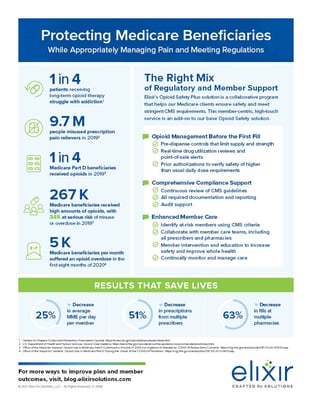America has been in the throes of an opioid epidemic since the late ‘90s, with half a million people dying of opioid overdoses between 1999 and 2019.[1] This situation affects all walks of life, including Medicare beneficiaries. While we began to see some improvement, the COVID-19 pandemic exacerbated the issue and 5,000 Medicare beneficiaries per month suffered opioid overdoses in the first eight months of 2020.[2]
The Centers for Medicare and Medicaid Services (CMS) have permitted Part D plan sponsors to establish Drug Management Programs (DMPs) for beneficiaries at risk of abusing or misusing opioids and other frequently abused drugs for several years, but as of January 1, 2022, it is requiring all Part D plan sponsors to establish a DMP (CMS-4190-F2).
A CMS-compliant DMP requires:
- Identification of at-risk beneficiaries through review of inclusion and exclusion criteria
- Quarterly clinical reviews of at-risk beneficiaries
- Appropriate determination and implementation of beneficiary level edits within the adjudication system
- Appeals processing subsequent to beneficiary level edits
- Completion of quarterly Acumen response forms
- Documentation of mandatory transaction type 90 data in the format determined by CMS in the Plan Communications User Guidance (PCUG)
- Documentation of beneficiary level edit notification, implementation, continuation and termination
- Reporting and outreach to identify DMP member dis-enrollment and new DMP member enrollment via Transaction Reply Codes (TRC 376)
Additionally, the DMP will be subject to program audits as part of the Coverage Determinations and Grievances (CDAG) audit protocol.
While there is an exemption for individual members residing in long-term care (LTC) facilities, there is not a plan-level exemption. This means that even a plan whose membership is fully comprised of members who reside in LTC facilities must have a CMS-compliant DMP in place to address overutilization of prescription opioid analgesics.
A Solution to CMS’ DMP Requirements
Elixir developed our Opioid Safety Plus program as an end-to-end solution that meets all of the DMP requirements for our Medicare Part D clients. With this multi-faceted solution, we identify at-risk beneficiaries and our specially trained Care Navigators engage their care teams, including all prescribers and pharmacies, and provide member support and interventions to help reduce opioid overutilization and negative outcomes associated with opioid consumption. Our knowledgeable Compliance team handles all of the required documentation and reporting, continually monitoring CMS guidelines and providing audit support.
For plan sponsors that do not delegate their DMP to Elixir, we will provide monthly oversight reporting for utilization of opioid claims in accordance with CMS guidance and adjusted as needed within the scope of future changes.
With a mission to achieve whole health, Elixir is committed to doing its part to end the devastating opioid epidemic. Our solution, which is intended to save lives, helps us get there together. It is a safety first, collaborative, member-centric solution that also helps our clients remain compliant with CMS regulations.
[1] Centers for Disease Control and Prevention. Understanding the Epidemic. https://www.cdc.gov/opioids/basics/epidemic.html.
[2] Office of the Inspector General. Opioid Use in Medicare Part D During the Onset of the COVID-19 Pandemic. https://oig.hhs.gov/oei/reports/OEI-02-20-00400.asp.


